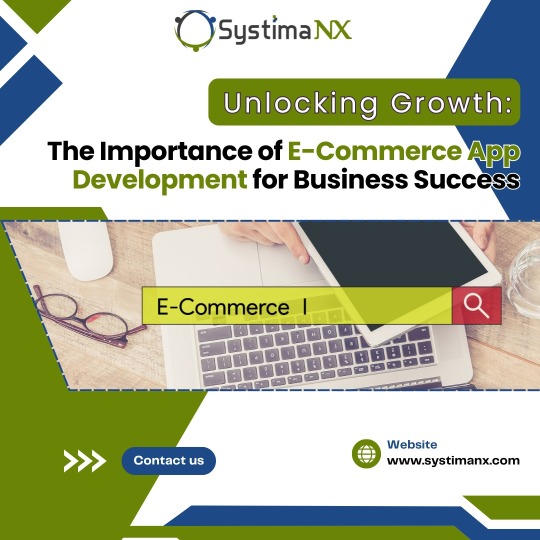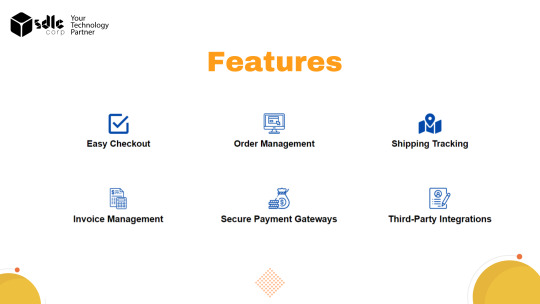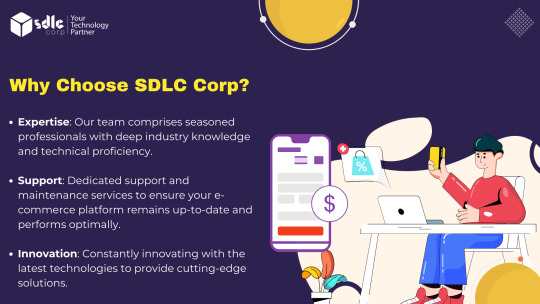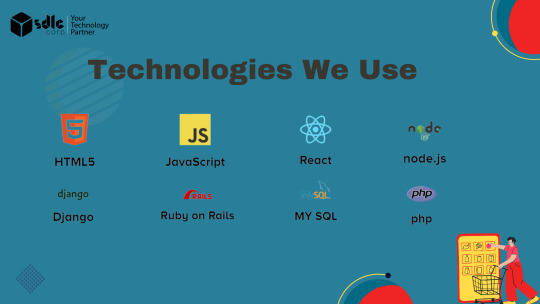#ecommerce developers
Explore tagged Tumblr posts
Text
Woxro: The Bright Head in the Lead of Ecommerce Development
Woxro is one of the highest level e-commerce development companies in the constantly changing digital economy. Woxro assures cutting-edge solutions for businesses with the sophisticated requirement of today's digital economy. Whether it's about B2B and B2C platforms or the most seamless integration, or simply a custom-built solution, the online business experiences get ignited through Woxro's services. Backed with the attitude of innovation and commitment towards making their clients successful, Woxro helps companies make strong digital platforms along with competitive markets. Check out these are the core e-commerce development services by which Woxro comes forward to be a preferred partner for businesses wanting to breathe new life into their online presence. Woxro is the leading ecommerce development company in India and is providing top notch services and solutions for you.

B2B Platform Development
The B2B interaction is at the heart of modern commerce; it has built B2B platforms that make such interactions easy and hassle-free. B2B marketplaces help a company reach its suppliers, shortlist potential partnerships, and make the transactions all from one centralized place. Woxro's B2B platforms are wide-ranging and ensure that customers experience security, reliability, and ease of use in all business operations in order to create confidence and efficient workflows. Woxro's B2B solutions are equipped with real-time inventory management, automated processes, and advanced analytics, meaning businesses can work efficiently and have valuable relationships that last long.
B2C Platform Development
Through ease-of-use, online shops to offer products for shopping, Woxro's B2C platform development services help businesses reach their customers and interact directly with them. Designed to convert visitors into loyal customers, Woxro's B2C platforms include all the comprehensive tools for managing products, processing secure payments, and engaging in more personalized experiences for shopping. Each is optimized to give an easy, enjoyable experience to the user as businesses stretch their reach to the customer, marketing being directed, and giving an enjoyable shopping experience that creates a sale and brand loyalty.

Platform Migration
Moving out from the outdated systems to modern scalable platforms often marks the beginning for businesses that want to remain competitive. Woxro professionals successfully migrate complexly numerous business operations from less than the minimum level of disruption. Woxro takes cautious control of data migration, system configuration, and testing processes while making the move to become more distant in terms of on-premise systems to cloud infrastructure, updating legacy technology, or changing platforms. When businesses engage with Woxro, they embrace the latest technologies, realize cost savings on operations, and boost the performance of the system with business continuity and efficiency intact.
Custom-Designed Platform Development
Woxro realises that every business is unique and has custom platform development services that provide bespoke solutions for a specific goal or workflow in place. These platforms are off-the-shelf by definition, designed from the ground up to meet a precise business need. Woxro's custom solutions are scalable and adaptive, allowing businesses to implement proprietary features, streamline workflows, and maximize flexibility. About Woxro's customization innovation integration: It ensures that the platforms continue to grow with the business and, thus, become an excellent basis for long-term growth as well as a competitive edge in the market.
CMS Integration
The integration of a content management system with your e-commerce platform has vast benefits within the operation, ranging from effective product management to advanced SEO capabilities. Woxro's content management system integration services enable businesses to access a single, easy-to-use interface for managing product descriptions, optimizing search content for better search engine rankings, and personalising shopping experiences. CMS integration, therefore, promotes ease of updates while bringing increased online visibility and engagement from customers. CMS integration helps companies create more engaging and dynamic experiences that talk to customers to convert them.
API Integration
API integration is a necessary concept for e-commerce platforms in an interlinked digital world, integrating with third-party applications, payment systems, and other services. Woxro's API integration services provide smoother interoperability between different software applications for easy information sharing and add-on features. Of course, payment gateway, CRM system, and APIs all resolve issues because their performance can grow without getting disconcerting of existing operations, Woxro ensures that. API integration makes the overall functionality and responsiveness of e-commerce platforms robust, flexible, and scalable enough to expand on further expectations.
Why Woxro for ECommerce Development?
At Woxro, you will find industry expertise, innovative technology and, above all, a client-centric approach that seeks tailored solutions for each business. Ecommerce development with Woxro's services is done to cater for the unique needs of every client so as to ensure robust, scalable solutions adapting to changing market demands. Whether it is a B2B, B2C platform, handling platform migrations, or integration with CMS and APIs, Woxro connects with technical pools of expertise in alignment with strategic insight to yield results. Businesses partner with Woxro to achieve advanced tools and custom solutions in enforcing the new path forward through their digital success.

Conclusion
Woxro e-commerce development solutions give businesses the possibility of a powerful and agile web presence. The products offered by Woxro for creating B2C growth strengthen customer engagement, streamline B2B relations, smooth migrates, and unlock API and CMS integrations that facilitate business clients' digital transformation with the platform. Equipping businesses with solutions that solve the challenges of the digital age, creating future-proof, impact-generating e-commerce, to drive business growth and success-all of these Woxro does.
#ecommerce#ecommerce development agency#ecommerce development services#ecommerce development company#ecommerce website development#ecommerce developers#web developers#web development#web graphics#web resources#shopify#woocommerce#online store#smallbusiness#websitedevelopmentcompany#search engine optimization#web design#website design#web hosting#website#social media#content creation#content creator#cms development services#cms#b2b#b2bmarketing#api integration
6 notes
·
View notes
Text
2 notes
·
View notes
Text
Ecommerce App Development: Powering the Future of Online Retail

In an era where mobile phones dominate digital interactions, ecommerce app development is reshaping the retail landscape. Consumers no longer rely solely on websites — they expect fast, personalized, and seamless shopping experiences directly from their smartphones. This shift has fueled the rise of ecommerce apps as a key driver of business growth in 2025 and beyond.
Modern ecommerce apps are more than just online stores; they’re intelligent platforms designed to enhance user engagement and retention. Features like AI-powered product recommendations, real-time order tracking, secure payment integration, and personalized notifications make mobile shopping not just convenient, but enjoyable. These innovations help brands increase conversion rates and customer loyalty.
Developing a robust ecommerce app requires a strategic approach. Businesses must consider scalable architecture, user-friendly design, and cross-platform compatibility. Integrating technologies like artificial intelligence, augmented reality (for virtual try-ons), and chatbots ensures your app stays ahead in the competitive digital marketplace.
Moreover, speed, security, and seamless checkout processes are crucial. Customers expect lightning-fast performance and data safety while shopping online. An optimized ecommerce app can also provide insightful analytics to help businesses understand consumer behavior and refine their strategies.
Partnering with a trusted ecommerce app development company like IMG Global Infotech can make all the difference. With years of experience in delivering high-performance retail solutions, they craft custom ecommerce apps tailored to your brand’s goals — whether it’s a B2C store, fashion marketplace, or niche D2C platform.
As ecommerce continues to evolve, investing in mobile-first solutions will be vital. A well-developed ecommerce app not only meets customer expectations but also sets your business up for long-term success in the fast-moving world of online retail.
#software development#ecommerce developers#ecommerce website development#ecommerce business#ecommerce#online shopping#online shopping clothes#online fashion shopping#retail#online delivery
0 notes
Text

Get custom eCommerce website development services that fit your business model. At InStep Technologies, we build scalable online stores with modern UI/UX, secure payment integration, mobile responsiveness, and fast performance. Launch a reliable shopping experience built for conversions and growth.
#custom ecommerce website development#ecommerce development services#online store development#ecommerce website design#ecommerce website development company#ecommerce developers#scalable ecommerce solutions#ecommerce development India#mobile friendly ecommerce#secure ecommerce development
0 notes
Text
Web Design Services Houston: Custom Websites That Work for Your Business
Web Design Services Houston: Build a Site That Converts, Not Just Looks Good Is your website actually working for you—or just sitting there? Most Houston businesses know they need a website. But a lot of them stop at the surface. A good-looking site that’s slow, outdated, or hard to use doesn’t bring results. That’s where solid web design services in Houston come in. At Richmond Tech Group, we…
#Affordable website design#business website development#Custom website design#ecommerce developers#Web design services Houston#website developer agency#Website redesign services
0 notes
Text
Which is Best for Ecommerce App Development? Shopify vs WordPress
Choosing the right platform for eCommerce app development is a critical decision for businesses looking to establish a strong online presence. Shopify and WordPress (with WooCommerce) are two of the most popular platforms for mobile eCommerce app development, each offering unique features, benefits, and limitations.
In this detailed comparison, we will evaluate Shopify and WordPress in terms of ease of use, customization, scalability, pricing, and security to help businesses choose the best platform for their needs.
1. Overview of Shopify and WordPress (WooCommerce)
Shopify
Shopify is a fully hosted eCommerce application development company solution that provides an all-in-one platform for businesses to build, manage, and scale their online store. It offers built-in hosting, security, payment gateways, and a range of themes and apps.
WordPress (WooCommerce)
WordPress is a content management system (CMS) that powers WooCommerce, a popular eCommerce app development plugin. Unlike Shopify, WordPress is self-hosted, meaning users must purchase hosting and domain services separately.
Both platforms support eCommerce app development services, but their approach to development differs significantly.
2. Ease of Use
Shopify – User-Friendly for Beginners
✔️ Hosted solution – No need for technical expertise. ✔️ Drag-and-drop builder with pre-built templates. ✔️ Quick setup with built-in payment processing.
WordPress – More Control but Requires Technical Knowledge
✔️ Open-source platform with endless customization. ✔️ Requires hosting setup and plugin management. ✔️ Best for businesses needing full control over their store.
Winner: Shopify (Better for beginners).
3. Customization & Flexibility
Shopify – Limited Customization
✔️ Provides pre-built themes and apps. ✔️ Offers customization but within its ecosystem. ✔️ Coding knowledge needed for advanced customizations.
WordPress – Highly Customizable
✔️ Open-source, allowing complete control. ✔️ Supports thousands of themes and plugins. ✔️ Ideal for businesses that require unique design and functionality.
Winner: WordPress (More flexibility for eCommerce mobile app development).
4. Scalability & Performance
Shopify – Scalable & Reliable
✔️ Built-in hosting ensures high performance. ✔️ Easily handles high traffic and large inventories. ✔️ Automatic updates and security.
WordPress – Scalable but Requires Optimization
✔️ Requires a good hosting provider for scalability. ✔️ Manual updates and security maintenance needed. ✔️ More suitable for businesses with dedicated technical teams.
Winner: Shopify (Best for hassle-free scalability).
5. Security & Reliability
Shopify – Secure & Compliant
✔️ SSL certificate and PCI compliance included. ✔️ Automatic updates and fraud protection.
WordPress – Requires Additional Security Measures
✔️ Security depends on hosting provider. ✔️ Needs extra security plugins and updates.
Winner: Shopify (More secure out of the box).
6. Pricing & Cost of Development
Shopify – Fixed Pricing Plans
💰 Shopify Basic: $39/month 💰 Shopify Standard: $105/month 💰 Advanced Shopify: $399/month ✔️ Includes hosting and security. ✔️ Transaction fees unless using Shopify Payments.
WordPress (WooCommerce) – Variable Costs
💰 Hosting: $10 - $50/month 💰 Domain: $10 - $20/year 💰 Plugins & Themes: $50 - $500 (one-time or annual fees) ✔️ No fixed monthly fees. ✔️ Pay only for what you need.
Winner: WordPress (More cost-effective, but Shopify is simpler).
7. Support & Maintenance
Shopify – 24/7 Support
✔️ Customer support via chat, email, and phone. ✔️ Automatic updates and bug fixes.
WordPress – Community-Based Support
✔️ Large community forums and third-party support. ✔️ Requires manual updates and troubleshooting.
Winner: Shopify (Better support for non-technical users).
8. Best Choice for Ecommerce Mobile App Development
Both Shopify and WordPress offer solutions for eCommerce mobile app development:
✔ Shopify – Best for businesses looking for a hassle-free, ready-made eCommerce mobile app development company. ✔ WordPress – Ideal for businesses that want full control and are willing to invest in custom eCommerce app development services.
💡 Choose Shopify if you want an easy-to-use, scalable solution with built-in security. 💡 Choose WordPress (WooCommerce) if you need complete control over customization and costs.
Conclusion: Shopify vs WordPress – Which is Best?
Both Shopify and WordPress are powerful platforms for eCommerce app development. The best choice depends on your business needs:
Shopify is ideal for those who want a simple, all-in-one solution without technical hassle.
WordPress (WooCommerce) is better for businesses that require flexibility and advanced customization.
If you’re unsure which platform suits your needs, consult an eCommerce app development company that offers eCommerce application development services. Whether you need Shopify or WordPress, professional eCommerce app developers can help build a mobile-friendly, high-performing online store.
💡 Ready to build your eCommerce app? Contact a top-rated eCommerce mobile app development company today!
#ecommerce app development#ecommerce app developers#ecommerce developers#ecommerce app development company
0 notes
Text

Enhance your online store with Magento’s scalable, secure, and feature-rich eCommerce solutions. Our expert Magento development services offer customization, multi-store management, AI-powered recommendations, and seamless integrations to create a high-performing, user-friendly shopping experience that sets your business apart.
#magento#ecommerce#software development#magento development#magento developers#ecommerce developers#ecommerce development
1 note
·
View note
Text
How Shopify Experts Optimize Product Pages for Sales
Professional Shopify experts know what it takes to make your product pages convert. From keyword-rich descriptions to compelling calls-to-action, they design listings that improve rankings and customer engagement. Learn the proven techniques used to turn casual browsers into loyal buyers.

#product add#ecommerce developers#fiverr#fiverr gigs#product description#product research#shopify#shopify experts#website design#ecommerce#product listing#product labels#product listing services#shopify product upload services#product upload services#shopify ecommerce development#ecommerce product upload#Online shop upload#best product management
0 notes
Text
Build Your Online Store with Expert eCommerce Developers
In the ever-evolving world of online retail, your eCommerce platform is the heart of your business. Whether you're looking to build a new online store or improve an existing one, our skilled eCommerce developers can make all the difference. They create seamless, user-friendly websites that not only captivate your audience but also drive sales. From integrating secure payment gateways to optimizing website performance, these professionals ensure your store stands out in the competitive market. Don’t just sell online - offer an unforgettable shopping experience. Invest in expert eCommerce developers and watch your business grow!
#eCommerce developers#eCommerce development company#eCommerce development company India#eCommerce Web Developers#ecommerce#ecommerce development
0 notes
Text
#ecommerce#ecommerce development agency#ecommerce development services#ecommerce development company#ecommerce website development#web developers#web development#web graphics#web resources#ecommerce developers
0 notes
Text
Unlocking Growth: The Importance of E-Commerce App Development for Business Success

Ever wondered how an e-commerce app could transform your business? Let me tell you a story. A small retail brand took the leap into app development. They weren't a household name, but they had ambition. Their secret weapon? An app that made shopping effortless for their customers. Soon, sales skyrocketed. User engagement doubled. Returning customers? Up by 70%. Their app didn't just sell products; it built relationships. In today's fast-moving market, a mobile app isn't just an option; it's a must-have. It offers personalized experiences, quicker checkouts, and direct communication. It's your brand in customers' pockets. What's stopping you from launching your app? 🤔 Let's chat in the comments. Share your thoughts or experiences!
#ecommerce developers#ecommerce development services#ecommerce website development#best ecommerce platform#technology#ecommerce website design
0 notes
Text
How to Build a Fashion App Like ASOS

Want to know how to build a fashion app like ASOS? Start with a sleek UI, real-time inventory, and personalized shopping features. Integrate secure payment gateways and style recommendation engines. To bring your vision to life, partner with IMG Global Infotech, a top fashion ecommerce app development company. They specialize in building high-performing, user-centric apps that reflect your brand and meet the dynamic needs of today’s online fashion shoppers.
#shop fashion online#fashion shopping app#online fashion shopping#fashion app#fashion design software#ecommerce developers#ecommerce website development#ecommerce business#online shopping clothes#clothes#online shopping
0 notes
Text

The Ultimate Guide to Search Engine Optimization for E-commerce Websites
The Ultimate Guide to Search Engine Optimization for E-commerce Websites is a wholesome booklet that provides an online business with what it needs to know and do for the enterprise to see visibility and rankings increases on search engines. The book covers it all, from product description optimization to speeding up your site and creating quality backlinks to actual Search Engine Optimization specifically for E-commerce. Take one giant leap for your online exposure and drive organic traffic to your store by learning how to implement the insights from this definitive SEO manual.
#ECommerce Solution#ECommerce Developers#ECommerce Dev Team#India#USA#Hire ECommerce Solution developers#Connect Infosoft Technologies#Hire Expert Digital Marketing Service Company India#SEO Service Company India#PPC Service Company India#Digital Marketing Company India#Digital Marketing Service Company#machine learning developer#machine learning development in india
1 note
·
View note
Text













E-Commerce Development Company: Insights and Innovations from SDLC Corp
The rise of e-commerce has transformed the global marketplace, offering unprecedented opportunities for businesses and consumers alike. Central to this transformation are ecommerce websites and apps, which serve as the digital storefronts and interaction hubs for online transactions. This blog explores the comprehensive landscape of ecommerce website development and app development, covering its history, current trends, technological advancements, and future prospects.
Introduction
Ecommerce development is a critical aspect of modern business strategy. With the surge in online shopping and digital transactions, having a robust ecommerce website and app presence has become imperative for businesses seeking to remain competitive. This comprehensive guide delves into the various facets of ecommerce development company, offering insights into best practices, essential technologies, and emerging trends.
Evolution of E-Commerce Technologies
Technological advancements have been the driving force behind the evolution of ecommerce. Key developments include:
Secure Payment Gateways: The introduction of secure payment gateways like PayPal and Stripe revolutionized online transactions.
Mobile Commerce (M-Commerce): The rise of smartphones led to the development of mobile-optimized websites and dedicated apps.
Cloud Computing: Enabled scalable, reliable, and cost-effective ecommerce solutions.
Key Components of E-Commerce Website Development
User Experience (UX) and User Interface (UI) Design
User experience and interface design are critical to the success of an ecommerce platform. Key considerations include:
Intuitive Navigation: Ensuring that users can easily find products and information.
Responsive Design: Creating a seamless experience across various devices and screen sizes.
Fast Load Times: Optimizing website performance to reduce load times and improve user satisfaction.
Platform Selection
Choosing the right ecommerce platform is crucial. Popular platforms include:
Shopify: Known for its ease of use and scalability.
Magento: Offers extensive customization options and is suitable for larger businesses.
WooCommerce: An open-source platform that integrates seamlessly with WordPress.
Secure Payment Processing
Implementing secure and reliable payment processing systems is essential. Key aspects include:
SSL Certificates: Ensuring that all transactions are encrypted.
Multiple Payment Options: Offering various payment methods to cater to different user preferences.
Fraud Prevention: Implementing measures to detect and prevent fraudulent transactions.
Product Management
Effective product management involves:
Catalog Management: Organizing products into categories and subcategories for easy navigation.
Inventory Management: Keeping track of stock levels and managing reorders.
Product Descriptions and Images: Providing detailed and accurate product information and high-quality images.
Key Components of E-Commerce App Development
Native vs. Hybrid Apps
When developing an ecommerce app, businesses must choose between native and hybrid approaches:
Native Apps: Built specifically for a single platform (iOS or Android), offering superior performance and user experience.
Hybrid Apps: Developed using web technologies (HTML, CSS, JavaScript) and can run on multiple platforms, reducing development costs.
Essential Features of E-Commerce Apps
Successful ecommerce apps share common features that enhance the user experience:
User-Friendly Interface: Simple and intuitive design.
Push Notifications: Keeping users informed about promotions, order status, and more.
Secure Payment Integration: Seamless and secure payment processing.
Personalization: Offering personalized recommendations based on user behavior and preferences.
Customer Support: Providing easy access to customer support through chat or call options.
Mobile Optimization
With a significant portion of ecommerce traffic coming from mobile devices, optimizing for mobile is crucial. Key aspects include:
Responsive Design: Ensuring that the app works well on various screen sizes.
Fast Load Times: Reducing load times to improve user satisfaction and retention.
Easy Navigation: Simplifying navigation to enhance the user experience.
Current Trends in E-Commerce Development
Artificial Intelligence (AI) and Machine Learning (ML)
AI and ML are transforming ecommerce in various ways:
Personalization: AI algorithms analyze user behavior to offer personalized recommendations and experiences.
Chatbots and Virtual Assistants: Providing instant customer support and enhancing user engagement.
Predictive Analytics: Helping businesses anticipate trends and optimize inventory management.
Augmented Reality (AR) and Virtual Reality (VR)
AR and VR technologies are enhancing the ecommerce experience:
Virtual Try-Ons: Allowing customers to virtually try on products like clothing, accessories, and makeup.
Immersive Shopping Experiences: Creating virtual stores where customers can browse and interact with products in a 3D environment.
Voice Commerce
With the rise of smart speakers and voice assistants, voice commerce is becoming increasingly popular:
Voice Search Optimization: Ensuring that ecommerce platforms are optimized for voice search queries.
Voice-Activated Shopping: Allowing users to make purchases using voice commands.
Subscription Services
Subscription-based ecommerce models are gaining traction, offering customers convenience and businesses a steady revenue stream:
Subscription Boxes: Delivering curated products to customers on a regular basis.
Membership Programs: Offering exclusive benefits and discounts to subscribers.
Sustainability and Ethical Practices
Consumers are increasingly prioritizing sustainability and ethical practices:
Eco-Friendly Products: Offering products that are environmentally friendly.
Ethical Sourcing: Ensuring that products are sourced ethically and sustainably.
Carbon Offsetting: Implementing measures to offset the carbon footprint of deliveries.
Future Prospects of E-Commerce Development
Blockchain Technology
Blockchain technology has the potential to revolutionize ecommerce:
Secure Transactions: Offering enhanced security for online transactions through decentralized ledgers.
Transparency and Traceability: Providing transparency in the supply chain, allowing consumers to verify the origin and authenticity of products.
Smart Contracts: Automating transactions and agreements through self-executing contracts.
5G Technology
The rollout of 5G technology will significantly impact ecommerce:
Faster Speeds: Enabling faster load times and seamless streaming of high-quality content.
Enhanced Mobile Experience: Improving the performance of mobile apps and websites.
New Possibilities: Enabling new technologies and experiences, such as real-time augmented reality.
Advanced Data Analytics
The future of ecommerce will be heavily influenced by advanced data analytics:
Predictive Analytics: Using data to predict consumer behavior and optimize marketing strategies.
Customer Insights: Gaining deeper insights into customer preferences and behaviors to enhance personalization.
Operational Efficiency: Using data to streamline operations and improve efficiency.
Internet of Things (IoT)
IoT technology will further integrate the physical and digital shopping experiences:
Connected Devices: Enabling smart devices to make purchases and interact with ecommerce platforms.
Inventory Management: Using IoT sensors to track inventory levels and manage stock in real-time.
Enhanced Customer Experience: Offering personalized experiences based on data collected from connected devices.
Ethical AI and Data Privacy
As AI becomes more integrated into ecommerce, ethical considerations and data privacy will be paramount:
Data Protection: Ensuring that customer data is protected and used ethically.
Transparent AI: Developing AI systems that are transparent and explainable to users.
Ethical AI Practices: Implementing ethical guidelines for the use of AI in ecommerce.
Best Practices for E-Commerce Development
Security and Compliance
Ensuring security and compliance is crucial for building trust with customers:
SSL Certificates: Implementing SSL certificates to encrypt data and secure transactions.
PCI DSS Compliance: Ensuring compliance with the Payment Card Industry Data Security Standard (PCI DSS).
Data Protection Regulations: Adhering to data protection regulations, such as GDPR and CCPA.
Scalability and Performance
Building scalable and high-performance ecommerce platforms is essential for handling growth:
Cloud Hosting: Leveraging cloud hosting solutions for scalability and reliability.
Load Testing: Conducting load testing to ensure the platform can handle high traffic volumes.
Performance Optimization: Continuously optimizing the platform for performance and speed.
User-Centric Design
Focusing on user-centric design enhances the user experience and drives conversions:
User Research: Conducting user research to understand the needs and preferences of the target audience.
A/B Testing: Implementing A/B testing to optimize design elements and improve conversion rates.
Accessibility: Ensuring that the platform is accessible to all users, including those with disabilities.
Continuous Improvement
The ecommerce landscape is constantly evolving, necessitating continuous improvement:
Regular Updates: Keeping the platform up-to-date with the latest technologies and features.
User Feedback: Collecting and analyzing user feedback to identify areas for improvement.
Market Trends: Staying informed about market trends and adapting the platform accordingly.
Conclusion
The development of ecommerce websites and apps is a dynamic and multifaceted field, driven by technological advancements and changing consumer behaviors. As businesses strive to stay competitive in the digital marketplace, understanding the key components, current trends, and future prospects of ecommerce development is essential. By adopting best practices and embracing innovation, businesses can build robust and successful ecommerce platforms that meet the evolving needs of their customers.
The future with SLDC Corp for ecommerce development solutions promises exciting possibilities, from the integration of AI and blockchain to the widespread adoption of 5G and IoT technologies. As these advancements continue to reshape the digital landscape, businesses must remain agile and proactive, continuously evolving their strategies to harness the full potential of ecommerce.
#ecommerce website development#ecommerce#ecommerce development company#ecommerce solutions#ecommerce developers#ecommerce app#ecommerce website developers#ecommerce app developers#ecommerce development platform#hire ecommerce developers
0 notes
Text
Boost Your Business with Professional SEO Marketing Services

View On WordPress
0 notes
Text
Elevate Your Startup with Expert E-Commerce Guidance
Elevating your e-commerce business can be a transformative journey, especially in today's competitive landscape. As an entrepreneur or startup, you understand that simply having a great product isn’t enough. You need a strategic approach to navigate the complexities of online selling. This is where marketplace consulting comes into play, offering tailored e-commerce development solutions that can help you thrive.
The Importance of Marketplace Consulting
Marketplace consulting provides businesses with the expertise needed to maximize their online presence. According to recent statistics, e-commerce sales are projected to reach $6.3 trillion by 2024, highlighting the immense potential for growth in this sector. However, with this growth comes increased competition. To stand out, you need to leverage the insights and strategies offered by marketplace consultants.
Understanding Your Market
One of the first steps in elevating your e-commerce business is understanding your market. Marketplace consultants conduct thorough market research to identify trends, customer behaviors, and competitive landscapes. This data-driven approach enables you to make informed decisions about product offerings, pricing strategies, and marketing tactics.For instance, a study revealed that 63% of consumers prefer to shop from brands that offer personalized experiences. By utilizing marketplace consulting, you can tailor your offerings to meet the specific needs of your target audience, thereby enhancing customer satisfaction and loyalty.
Crafting a Unique Selling Proposition
In a crowded marketplace, having a unique selling proposition (USP) is crucial. Consultants work with you to define what sets your brand apart. This could be anything from exceptional customer service to innovative product features. By clearly articulating your USP, you can create a compelling narrative that resonates with potential customers.
Optimizing Your Online Presence
Your online presence is your storefront in the digital world. Marketplace consultants help optimize your listings across various platforms, ensuring that your products are easily discoverable. This includes keyword optimization, high-quality images, and engaging product descriptions.Statistics show that 70% of consumers look for product information online before making a purchase. By investing in your online presence, you increase your chances of being found by these potential customers.
Leveraging Data and Analytics
Data is a powerful tool in the e-commerce realm. Marketplace consulting services provide you with the analytics needed to track performance metrics, customer behavior, and sales trends. By analyzing this data, you can identify what’s working and what needs improvement.For example, if you notice a drop in sales for a particular product, consultants can help you investigate the cause—be it pricing issues, lack of visibility, or customer feedback. This proactive approach allows you to make timely adjustments that can significantly impact your bottom line.
Streamlining Operations
Efficiency is key in e-commerce. Marketplace consultants assist in streamlining your operations, from inventory management to order fulfillment. By implementing best practices and automation tools, you can reduce manual errors and improve turnaround times.A well-optimized operation can lead to a 30% increase in productivity, allowing you to focus on strategic growth rather than day-to-day logistics. This is particularly beneficial for startups looking to scale quickly without compromising service quality.
Enhancing Customer Experience
Customer experience is paramount in retaining clients and driving repeat business. Marketplace consultants emphasize the importance of creating a seamless shopping experience. This includes easy navigation, fast load times, and responsive customer service.According to research, 86% of buyers are willing to pay more for a better customer experience. By investing in marketplace consulting, you can enhance every touchpoint of the customer journey, ultimately leading to increased sales and brand loyalty.
Navigating Multiple Marketplaces
As an entrepreneur, you may be tempted to sell on multiple platforms to reach a wider audience. However, managing multiple marketplaces can be challenging. Marketplace consultants provide guidance on which platforms are best suited for your products and help you navigate the complexities of each.For instance, selling on Amazon, eBay, or niche-specific platforms requires different strategies. Consultants can assist you in tailoring your approach for each marketplace, ensuring that you maximize your reach without overwhelming your resources.
Building a Strong Brand Identity
A strong brand identity is essential for long-term success. Marketplace consulting helps you develop a cohesive brand strategy that resonates with your audience. This includes everything from logo design to brand messaging.In a survey, 77% of consumers make purchases based on a brand’s reputation. By establishing a strong brand presence, you not only attract new customers but also foster trust and loyalty among existing ones.
The Role of E-Commerce Development Companies
Partnering with an e-commerce development company can further enhance your marketplace consulting efforts. These companies offer technical expertise and support, ensuring that your online platform is robust and scalable. In Canada, for example, many e-commerce development companies specialize in creating tailored solutions that cater to the unique needs of local businesses. By combining marketplace consulting with the technical prowess of an e-commerce development company, you can create a powerful synergy that drives growth.
Embracing Online Consulting Platforms
In today’s digital age, online consulting platforms have emerged as valuable resources for entrepreneurs. These platforms connect you with experienced consultants who can provide insights and strategies tailored to your business needs. Engaging with an white label online consulting platform allows you to access a diverse range of expertise without the constraints of geographical boundaries. This flexibility can be particularly advantageous for startups looking to tap into global markets.
Conclusion
Elevating your e-commerce business through marketplace consulting is not just a strategy; it's a necessity in today’s fast-paced digital environment. By leveraging the insights and expertise of consultants, you can craft a unique market presence, optimize your operations, and enhance customer experiences. As you embark on this journey, remember that success in e-commerce is not solely about the products you sell but how you present them to the world. With the right consulting support, you can navigate the complexities of the online marketplace and position your business for sustainable growth. Embrace the opportunities that marketplace consulting offers, and watch your e-commerce venture thrive.
#consulting app#consulting platform#ecommerce developers#hire developers#hire app developer#mobile app development#hire mobile app developers#ios app development#android app development#ecommerce#startup
0 notes